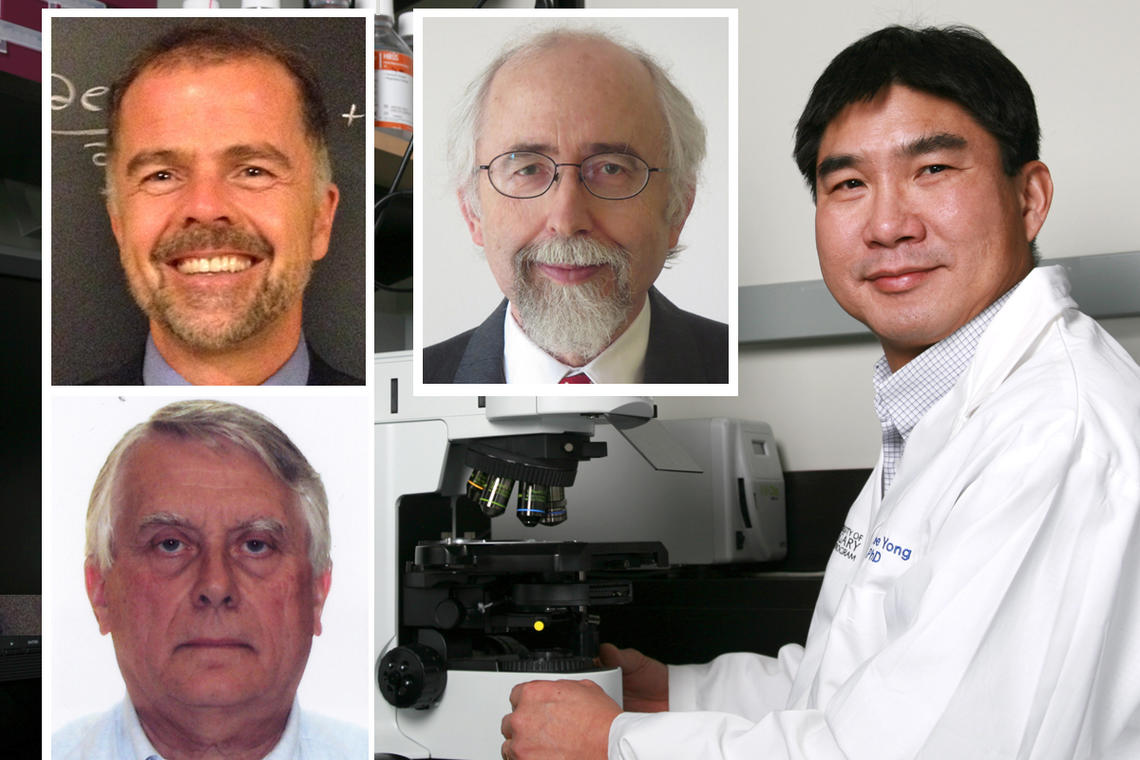Sept. 9, 2014
Royal Society of Canada recognizes four university scholars

Clockwise from top left: Scott Taylor, Przemyslaw Prusinkiewicz, Dr. V. Wee Yong, and Jos Eggermont.
Four scholars from the University if Calgary — Jos Eggermont, Przemyslaw Prusinkiewicz, Scott Taylor and V. Wee Yong — have been named fellows to the Royal Society of Canada (RSC), the highest honour that can be attained by scholars, artists and scientists in Canada.
Jos Eggermont
“I feel very honored by this election, particularly because I am working in the small field of auditory neuroscience, with only a few but very good colleagues in Canada working in that field,” says Jos Eggermont, professor emeritus of psychology and physiology and pharmacology. “I hope it will draw more attention to this field of research.”
Eggermont studies the auditory system and has produced a large number of “firsts” over his long and distinguished career. He is currently exploring the consequences of his earlier work that found adults with long-term exposure to non-damaging sound may affect speech understanding in the absence of hearing loss. This strongly suggests that even using ear protection in noisy environments leaves the auditory brain prone to changes that may affect human communication.
Przemyslaw Prusinkiewicz
“I’m happy that my research has been recognized by the RSC,” says Przemyslaw Prusinkiewicz, a computer science professor and pioneer of employing computational models in developmental plant biology. “I am honoured and find it rewarding that my nomination came from within the university, which testifies to the recognition of my work here. Reciprocally, I believe that my election to the RSC sheds a positive light on the university.”
Prusinkiewicz introduced methods for modelling and visualizing plants which make it possible to simulate plant development with unprecedented biological and visual fidelity. Working with biologists, he constructed models that help explain fundamental developmental processes in plants and answer some of the key questions of developmental plant biology. His work was instrumental in the acceptance of computational models as an important research tool in plant biology.
Scott Taylor
Scott Taylor, economics professor and Canada Research Chair in International, Energy and Environmental Economics, is honoured to receive the “lifetime achievement award” of joining the RSC. “I am very happy about it,” he says. “To have your peers vote you in to such a prestigious body is a great compliment. I guess it’s also confirmation that you’ve made a significant contribution.”
Taylor started working on the implications of globalization on the environment over 20 years ago. He was one of the first scholars to help define “what the questions were” and how economic methods might be brought to bear to answer those questions. His research looks at how a country's access to international markets affects environmental outcomes both at home and abroad. It asks, for example, how international trade and economic growth affect pollution in major cities and how globalization has affected biological resources worldwide.
V. Wee Yong
“I am humbled to join the ranks of many giants who have made substantial discoveries to understanding biology and to improve human health,” says Dr. V. Wee Yong, Canada Research Chair in Neuroimmunology, co-director of the Multiple Sclerosis (MS) Program of the Hotchkiss Brain Institute, and professor in the departments of clinical neurosciences and oncology. “The induction will motivate me further to increase our understanding of neurological diseases, and to find new treatments for these devastating conditions.”
Yong has accomplished a significant body of research into three diseases of the central nervous system (CNS) — multiple sclerosis, spinal cord injury and brain tumours (gliomas) — work that has been translated into clinical trials in MS and spinal cord injury. His research is furthering our understanding of neuroinflammation, and ultimately helping in the quest toward meaningful recovery from nervous system disorders and a spectrum of other neurological diseases.

